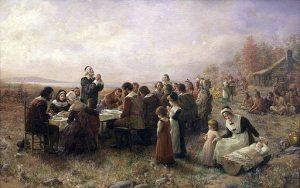Posted by Candice on Friday, Nov 10, 2017

I love finding out what is behind our holidays and traditions--why do we put a tree in the house? why the painted eggs? why did he put ashes on my forehead?--but Thanksgiving is one of those that I hadn't given much thought to. According to Bruce Forbes and his excellent America's Favorite Holidays, the holiday we celebrate today is pretty straightforward and connected to events that happened in our country's past, although not in the way I had imagined.
We can thank the Puritans for getting us started with the holiday. Much of the reason they wanted to leave England was to have their religion the way they wanted it, and one of the things they wanted was fewer holidays. The Church used to be pretty big on them, with lots of days to recognize saints, have feasts, practice penitence--well over 100 days per year for a long time, including Sundays--and all of this time off meant less work, less pay, more goofing off. Puritans felt that Sundays should be used for worship and other religious acts, and aside from that there should only be a few days a year for either giving thanks and feasting (when good things happened) or for fasting and penitence (when not-so-good things happened). These days were most often proclaimed by religious authorities, and started to be somewhat common, although only when warranted. However, as the population of the colonies grew, the desire for the traditional harvest festival did as well, and even the Puritans were swayed by that.
By the mid-1600s, small farm towns began to proclaim days of feasting after the harvest, and by the 1700s, annual days had been declared in several colonies. However, these holidays were not on the same date, and they were not recognized everywhere. They were held in late fall, always on a Thursday (so they didn't disrupt regular church services), and generally consisted of worship and a family dinner. At the same time, other days of feast and fast were being proclaimed by the Continental Congress; these were usually in conjunction with a victory or defeat during times of warfare or the signing of a treaty, but many of these feast days were held in late fall as well. Many colonists resisted these holidays as being forced upon them by government and for lauding things that some did not agree with, and the days fell out of favor.
The harvest-time day of thanks tradition remained and grew, though, in large part due to the westward movement of large numbers of New Englanders who celebrated it wherever they went. There was also a concentrated effort by a woman named Sarah Hale to formalize the event, seeing it as a prime example of the New England way of life that all should adopt. She spent decades of her life sharing the stories and traditions of the holiday with readers of the publication she edited, Godey's Lady's Book. She must have been persuasive, as numerous states began to formally recognize the day. Thanksgiving was declared a national holiday when Abraham Lincoln signed a proclamation in 1863, which called for a day of giving thanks on the last Thursday in November, not tied to any conflict or treaty. In 1941, Congress and FDR passed legislation that made Thanksgiving a legal holiday, now officially on the 4th Thursday of November, which in essence was to benefit retailers who wanted to get an early start on Christmas retail during the Novembers that had five Thursdays.
What about the pilgrims sharing that first dinner with members of the Wampanoag tribe, you ask? Well, turns out that people didn't really even know about that until the early 1800s, when a letter from Mayflower passenger Edward Winslow was found. The letter was written in December of 1621, and talks about how the Puritans and Wampanoag near Plymouth spent three days feasting and entertaining. They ate birds and deer, and spent some time shooting guns for fun ("amongst other Recreations," he says). This event does not appear to have been repeated or recognized in Plymouth, and has little to do with the days of 'thanks giving' that the Puritan leaders later held, either in form or influence. It is, however, much more in-line with the day we celebrate now--less to do with religion, more to do with family, food, and having a good time. I suspect that more than one pilgrim fell asleep in a recliner with the football game on, but Winslow seems to have omitted that from his letter.


This book got rave reviews and has been very popular, but I had to give it mention...You'll be left wondering just what kind of person steals pieces of art on a weekly basis, from churches and small museums, in order to basically create their own collection of hundreds of priceless items. That they then store in their room. In their mother's house. For real. -Candice